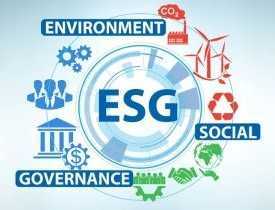Description
Course Name: Diploma in Environmental, Social and Governance
Course Id: DESG/Q1001.
Eligibility: Completion of 10+2 (higher Secondary) or equivalent.
Objective: A Diploma in Environmental, Social, and Governance (ESG) is an excellent qualification for individuals looking to contribute to sustainable development and ethical business practices. It prepares graduates to navigate the complex challenges of balancing profitability with environmental and social responsibility while ensuring compliance with governance standards.
Duration: Six Months.






Debit/Credit Card, Wallet, Paytm, Net Banking, UPI, or Google Pay.



• A soft copy (scanned) of your certificate via email within 7 days of examination.
• A hard copy (original with official seal and signature) sent to your address within 45 day of declaration of result.

Online Examination Detail:
- Duration- 120 minutes.
- No. of Questions- 60. (Multiple Choice Questions).
- 10 Questions from each module, each carry 10 marks.
- Maximum Marks- 600, Passing Marks- 40%.
- There is no negative marking in this module.
| How Students will be Graded: | ||
| S.No. | Marks | Grade |
| 1 | 91-100 | O (Outstanding) |
| 2 | 81-90 | A+ (Excellent) |
| 3 | 71-80 | A (Very Good) |
| 4 | 61-70 | B (Good) |
| 5 | 51-60 | C (Average) |
| 6 | 41-50 | P (Pass) |
| 7 | 0-40 | F (Fail) |







Syllabus
Corporate Governance: Introduction, the principles of governance, corporate governance structure, environmental, social and governance, the corporate governance score card, climate related financial disclosures, definition of corporate governance, current scenario, obligation to investor, agent and institution, social responsibility: csr in India, use and other countries, CSR laws in India.
Data Governance: The need for a data governance framework, Data governance framework as information architecture, The DBHIDS data governance framework strategic plan, DBHIDS information architecture principles, DBHIDS data governance goals, Data management strategies.
Environmental Ecology: Introduction to environment, the earth’s environment, environmental factors, introduction to environmental science, environmental education, types of ecology, types of ecosystems, fire and burning, global ecosystems and ecosystem development, ecosystem modelling, ecological engineering.
Environmental Management System: Introduction, the establishment of environmental management, recommended reading and resources, environmental management fundamentals and goals, environmental management—business and law, standards, monitoring, modelling, eco-auditing and environmental management systems, environmental management, environmentalism, environmental.
Stakeholders Rights: Introduction, Need for whistle blowing mechanism, some whistle blower cases in India, Safeguards to whistle blowers, Health and safety, Case study google.
Social Factors: Introduction, Factors of Social Change, Education as factors of Social Change, Meaning of Social Change, Social factors, Education, Business, Addressing disadvantage, Migrant Youth.
Job Opportunities after completion of Diploma in Environmental, Social and Governance course:
After completing a Diploma in Environmental, Social, and Governance (ESG), graduates gain expertise in sustainability practices, corporate responsibility, and ethical governance. This qualification prepares individuals to work in industries focusing on sustainable development, compliance, and ESG reporting.
Career Options for Diploma in ESG Graduates
1. ESG Analyst
- Role: Assess and report on a company’s environmental, social, and governance practices.
- Responsibilities:
- Analyzing ESG data and metrics.
- Preparing sustainability reports.
- Recommending improvements in ESG strategies.
- Industries: Financial services, consulting, corporates.
2. Sustainability Officer
- Role: Develop and implement sustainability initiatives.
- Responsibilities:
- Designing eco-friendly policies.
- Monitoring energy and resource consumption.
- Ensuring compliance with sustainability regulations.
- Industries: Manufacturing, retail, energy.
3. Corporate Social Responsibility (CSR) Manager
- Role: Manage CSR programs and community engagement.
- Responsibilities:
- Planning and executing social impact projects.
- Collaborating with NGOs and community groups.
- Reporting on CSR activities and outcomes.
- Industries: Corporates, non-profits, public sector.
4. ESG Compliance Specialist
- Role: Ensure adherence to ESG-related laws and regulations.
- Responsibilities:
- Auditing corporate ESG practices.
- Preparing compliance documentation.
- Advising management on regulatory changes.
- Industries: Finance, legal, consulting.
5. Environmental Consultant
- Role: Advise organizations on minimizing environmental impact.
- Responsibilities:
- Conducting environmental impact assessments.
- Recommending sustainable resource use.
- Supporting green certification processes.
- Industries: Construction, agriculture, energy.
6. Governance Risk Manager
- Role: Assess and manage governance risks within organizations.
- Responsibilities:
- Identifying governance gaps.
- Proposing ethical and transparent practices.
- Monitoring board and executive accountability.
- Industries: Corporates, government, finance.
7. ESG Consultant
- Role: Guide companies in improving ESG performance.
- Responsibilities:
- Developing ESG strategies.
- Training staff on sustainability practices.
- Assisting in ESG certifications and audits.
- Industries: Consulting firms, NGOs, corporates.
8. Impact Investment Analyst
- Role: Evaluate investments based on ESG criteria.
- Responsibilities:
- Assessing companies’ ESG scores for potential investments.
- Recommending sustainable and ethical investment opportunities.
- Monitoring ESG risks in portfolios.
- Industries: Banking, investment firms, financial services.
9. Renewable Energy Project Manager
- Role: Oversee projects focused on clean energy solutions.
- Responsibilities:
- Managing renewable energy initiatives like solar and wind power.
- Ensuring environmental compliance.
- Collaborating with stakeholders to implement sustainable energy.
- Industries: Energy, government, technology.
10. Social Impact Specialist
- Role: Evaluate and enhance social contributions of organizations.
- Responsibilities:
- Developing policies for employee well-being.
- Overseeing community-focused programs.
- Measuring social impact through metrics.
- Industries: Non-profits, public sector, corporates.
Industries and Work Environments:
- Finance: Supporting ESG investment and risk analysis.
- Corporate: Improving sustainability and governance strategies.
- Consulting: Advising businesses on ESG compliance.
- Energy: Focusing on renewable and sustainable practices.
- Public Sector: Promoting social and environmental policies.
Salary Range in India:
- Entry-Level (0-2 years): ₹3.5 LPA – ₹6 LPA.
- Mid-Level (2-5 years): ₹6 LPA – ₹12 LPA.
- Senior-Level (5+ years): ₹12 LPA – ₹20 LPA or more.
Conclusion:
A Diploma in ESG provides graduates with the knowledge to address pressing environmental and social challenges while ensuring ethical corporate governance. This qualification opens doors to impactful careers in sustainability-focused industries, offering both professional growth and societal contributions.

